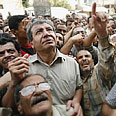
Humanitarian crisis underway
צילום: רויטרס
Playing with fire
Cutting off Gaza power could result in environmental disaster outside Strip as well
On September 19, 2007 the Israeli government decided to adopt sanctions against the civilian population in the “hostile entity” of Gaza. Every Qassam that lands in Israel will come with a price tag: cutting off the electricity or fuel supply, based on the assumption that undermining the normal day-to-day lives of Gaza residents would have positive political implications for Israel.
This basic assumption is old and false – there is almost no normal day-to-day life in Gaza these days and the civilian population has been facing a reality of collective punishment on Israel’s part for a while now. Since the rise of Hamas, Israel tightened almost hermetically the siege on the Gaza borders it controls; raw materials are not coming in, exports have been suspended, the Strip’s economy is being choked up, and a million and a half people are trapped in a pressure cooker. Gaza residents depend on Israeli decisions regarding the transfer of goods and people as well as on the assistance of Western and Islamic aid organizations.
The Israeli government decided, according to reports, to use the supply of water and fuel and the transfer of goods as a legitimate tool for sanctions against Gaza’s civilian population, and in the same breath declared that it would “refrain from creating a humanitarian crisis.” However, limiting the supply of electricity and fuel would hurt first and foremost medical devices, refrigerated food, and other essential elements.
Israeli beaches may be polluted
The Israeli government’s decision to cut the supply of electricity and fuel would also hurt the water supply, because Gaza’s pumping stations, just like sanitation systems, are operated by electricity. However, there would be nothing new about this; Israel is already undermining Gaza’s water infrastructure, and the Strip is already seeing the emergence of a severe water crisis, whose implications could bring about a humanitarian and environmental disaster in Gaza and outside of it as a result of the pollution of sea water and beaches in Israel as well and the possible spread of disease.
In recent months, Israel is not allowing the transfer of spare parts and equipments for Gaza’s water infrastructure. The stocks of spare parts are running out, and some pumps no longer have any spare parts at all. The absence of major infrastructure and equipment components would lead to the collapse of the water and sanitation systems, and such collapse would certainly cause floods and the leakage of sewage into the sea and drinking water.
Israeli officials claim that when it comes to humanitarian issues, Gaza’s needs are addressed. The truth is far from it. Safe access to clean water is a basic humanitarian right, which is apparently absent in the minds of Israeli decision-makers. Polluted water and a lack of hygiene constitute the 10th leading cause of the death in the world.
Most of the 1.5 million of men, women, and children who reside in the “hostile territory” of Gaza do not plot any malicious acts against Israel and are not a party to the firing of Qassam rockets. Most of us aspire for normalcy and peaceful life with our neighbors, who would do well to remind their government that undermining the water supply can be just the same as playing with fire.
Maher Najer is the deputy director of Gaza’s water company










